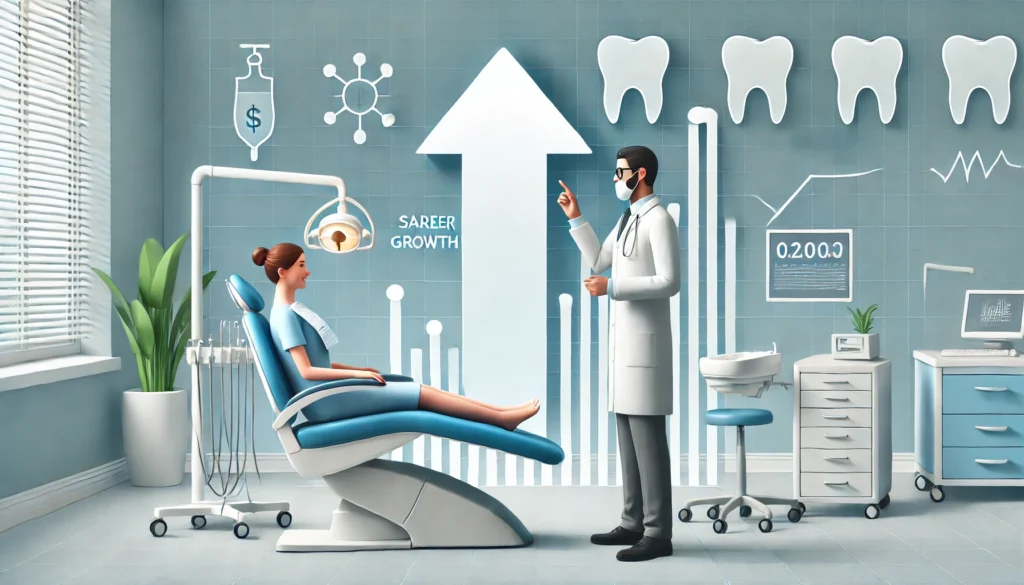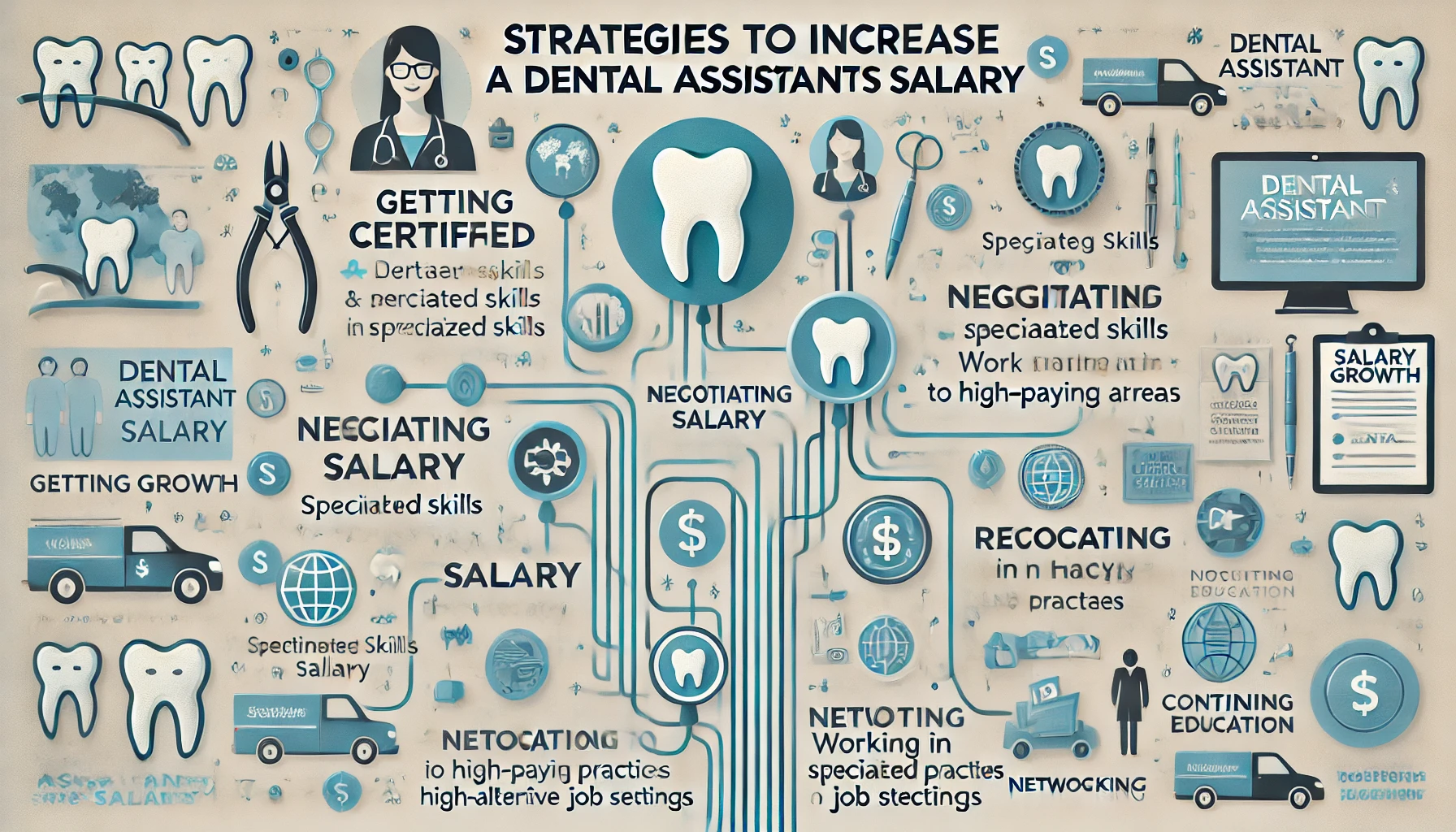How can you fast-track a dental assistant salary increase and maximize your earning potential? Dental assistants are essential in the dental care team, yet many are stuck in low-paying positions. If you’re an aspiring or current dental assistant looking to maximize your earning potential, it’s important to know the steps you can take to increase your salary.
The good news? It’s possible to increase your income to $60k or more, even if you’re starting from an entry-level position. In this guide, we’ll explore how dental assistants can leverage certifications, specialized skills, and smart career moves to achieve higher salaries quickly.

1. Get Certified: Your Fast-Track to Higher Pay
Obtaining professional certification is one of the easiest and fastest ways to increase your dental assistant salary. Certification enhances your credibility and makes you a more attractive candidate for high-paying positions.
Key Certification: Certified Dental Assistant (CDA)
- Offered by the Dental Assisting National Board (DANB), the CDA credential demonstrates proficiency in essential dental assistant duties such as chairside assisting, infection control, and radiology.
- Salary Impact: Dental assistants with a CDA certification typically see a salary increase of 10-20%.
Steps to Certification:
- Complete an accredited dental assistant program or on-the-job training.
- Pass the CDA exam covering general chairside duties, radiation safety, and infection control.
- Renew your certification every year through continuing education (CE).
Pro Tip: Some states offer additional certifications for expanded functions, such as placing dental sealants and performing coronal polishing, which can lead to even higher wages.

2. Expand Your Skillset: Specialize to Earn More
Specialized skills can significantly increase your earning potential as a dental assistant. Many dental practices are willing to pay more for assistants with advanced skills, especially in high-demand areas of dentistry.
High-Paying Specializations:
- Radiology Certification: Assistants qualified to take X-rays are highly sought after. Earning this certification can increase your salary by up to 10%.
- Expanded Function Dental Assistant (EFDA): EFDAs can perform additional clinical tasks like placing fillings, making impressions, and applying sealants. These specialized roles command higher pay because they take on more complex duties.
- Surgical Dental Assisting: Assisting in oral surgeries requires more skill, but it can significantly increase your salary, especially in oral surgery and periodontic practices.
How to Specialize:
- Identify in-demand skills in your area (e.g., radiology, orthodontics).
- Complete additional training and earn the necessary certifications.
- Apply for positions in specialized dental practices.
Pro Tip: Earning specialized skills can increase your pay by 15% or more, depending on your location and the demand for those skills.

3. Negotiate Your Salary: Get What You Deserve
Negotiating your salary is one of the quickest ways to increase your income, yet many dental assistants overlook this step. Whether you’re applying for a new position or seeking a raise at your current job, it’s essential to come prepared with facts.
Tips for Successful Salary Negotiation:
- Do Your Research: Before negotiating, research the average salary for dental assistants in your area using tools like the U.S. Bureau of Labor Statistics or Glassdoor. This data will help you set realistic expectations.
- Highlight Your Value: Emphasize any certifications, specializations, or additional responsibilities you’ve taken on, such as managing office duties or handling patient scheduling.
- Be Confident: Don’t hesitate to ask for a higher salary, especially if you bring valuable skills and certifications.
Pro Tip: A successful salary negotiation can increase your pay by 5-10%, especially if you have specialized certifications.
4. Dental Assistant Salary Increase: Relocate to High-Paying Areas
Where you work can significantly impact your salary. Some states and cities offer higher pay for dental assistants due to the cost of living, demand for dental care, and state-specific regulations.
Top-Paying States for Dental Assistants:
- Alaska: $53,100 per year
- Minnesota: $52,220 per year
- Massachusetts: $51,920 per year
- New Hampshire: $51,160 per year
Moving to a state with higher pay rates can fast-track your path to a $60k salary if you’re open to relocation. Additionally, urban areas with a higher cost of living often pay dental assistants more than rural locations.
Professionals can explore healthcare salary variations across the U.S. and consider locum tenens roles for flexible, high-earning opportunities to maximize income potential.
5. Work in Specialized Practices for Better Pay
Dental assistants who work in specialized practices, such as orthodontics or oral surgery, tend to earn higher salaries than those in general dental offices. These practices often require assistants with advanced skills willing to pay more for their expertise.
High-Paying Dental Specialties:
- Orthodontics: Orthodontic offices pay more due to the specialized care required for braces and alignment treatments.
- Oral Surgery: Assisting with surgeries and anesthesia administration can significantly increase your pay.
- Endodontics: Working in a practice focused on root canal therapy often pays more due to the complexity of the procedures.
Pro Tip: Consider applying to larger practices or dental chains, which may offer higher salaries and better benefits.

6. Continue Your Education: Invest in Long-Term Growth
Continuing education is crucial for career growth in the dental field. Investing in additional training shows employers that you’re committed to staying current on the latest technologies and techniques, which can open doors to higher-paying positions.
Continuing Education Options:
- Infection Control Updates: Stay updated on the latest infection control protocols to keep your skills relevant.
- Dental Technology Courses: Learn how to use the latest dental tools and software, which can make you a more valuable asset to your team.
- Management Training: Dental assistants who take on office management duties like billing and patient scheduling can earn significantly more.
7. Network for Success: Build Connections to Unlock Opportunities
Networking can help you find better-paying jobs and advance your career. Connecting with other professionals in the dental field can lead to job referrals or inside information about high-paying positions.
How to Build Your Professional Network:
- Join Professional Organizations: Membership in organizations like the American Dental Assistants Association (ADAA) can help you access valuable resources and networking events.
- Attend Conferences: Industry conferences are a great way to meet potential employers and learn about job openings in high-paying practices.
- Online Communities: Join dental assistant forums and social media groups to stay connected with peers and mentors.
Pro Tip: Networking can help you stay informed about high-paying job openings and new certifications that could increase your salary.
Networking can be transformative for career growth. Discover tips on building a strong healthcare network that supports your professional advancement.
8. Explore Alternative Job Settings for a Dental Assistant Salary Increase
While most dental assistants work in private practices, alternative job settings offer higher salaries and better benefits. Public health clinics, schools, and corporate dental chains frequently pay more than small, independent practices.
Alternative Job Opportunities:
- Public Health Clinics: Dental assistants in public health often earn more due to the increased funding for these programs.
- Dental Schools: Working in an academic setting can provide both a competitive salary and opportunities for professional development.
- Corporate Dental Chains: Large dental chains typically offer better benefits and higher pay due to their larger scale.
Conclusion: Strategies for a Dental Assistant Salary Increase
By following these steps—getting certified, specializing your skills, negotiating your salary, and exploring high-paying job opportunities—you can easily increase your dental assistant salary to $60k or more. Whether you’re just starting your career or looking to advance, taking small but strategic steps will help you achieve long-term financial success in dental.
With the right combination of certifications, skills, and networking, you’ll be on your way to a rewarding and lucrative career as a dental assistant.

| Strategy for Salary Increase | Description | Potential Salary Impact |
|---|---|---|
| Get Certified | Obtain certifications like CDA and EFDA to enhance qualifications. | 10-20% increase |
| Expand Your Skillset | Specialize in high-demand areas, such as radiology or surgical assisting. | 15% or more increase |
| Negotiate Your Salary | Research salaries, highlight skills, and confidently negotiate. | 5-10% increase |
| Relocate to High-Paying Areas | Consider moving to states or cities with higher demand and pay for dental assistants. | Up to 20% increase |
| Work in Specialized Practices | Specialized roles in orthodontics, oral surgery, and endodontics offer higher pay. | Higher than general practices |
| Continue Your Education | Take additional courses in infection control, management, or dental tech to enhance career growth. | Improves long-term earning potential |
| Network for Career Advancement | Join organizations, attend conferences, and engage in online communities for better job opportunities. | Access to higher-paying job referrals |
| Explore Alternative Job Settings | Public health clinics, dental schools, and corporate chains often pay more than private practices. | Often higher than private practice rates |
FAQ: Increase Your Dental Assistant Salary
1. How can I increase my salary as a dental assistant?
Get certified, specialize in high-demand skills, negotiate pay, relocate to high-paying areas, and continue your education.
2. Which certifications are valuable?
The Certified Dental Assistant (CDA) is highly recognized. Other useful certifications include radiology and expanded functions (EFDA).
3. Does location affect my salary?
Yes, states like Alaska, Minnesota, and Massachusetts offer higher pay, especially in urban areas with higher demand.
4. Can I earn more in specialized practices?
Yes, orthodontics, oral surgery, and endodontics often pay higher due to the specialized skills required.
5. How much can I earn with advanced certifications?
Certifications can increase pay by 10-20%, with specialized roles potentially adding even more.
6. Is it realistic to aim for $60k?
With the right skills, certifications, and strategic moves, a $60k salary is achievable.
7. How can networking help?
Networking with industry groups like ADAA can lead to job referrals and access to high-paying opportunities.
8. Are alternative settings higher paying?
Yes, public health clinics, dental schools, and corporate chains often pay more than private practices.







